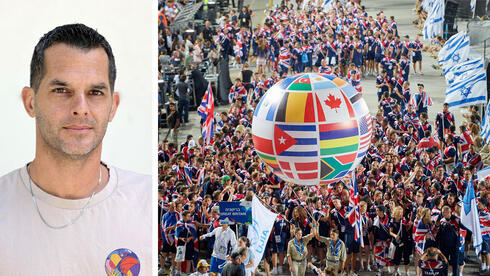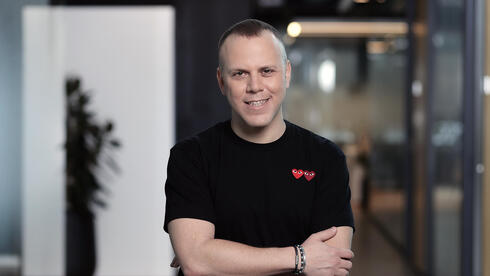
“More than ever”: Maccabiah marches on despite war
CEO Roy Hessing on solidarity, safety concerns, and why the Games must go on.
“We decided to hold the Maccabiah no matter what - to show our neighbors that we are not here just to fight, but also to return to normal life,” said Maccabiah CEO Roy Hessing in an interview with Calcalist.
“I hope we reach the end of the war and see the return of the hostages, that would bring relief to all of us,” he continued. “In our worst nightmares, we never imagined holding the Maccabiah while hostages were still being held in Gaza. We will acknowledge this reality in all our ceremonies and competitions. It’s impossible to carry on as if everything is normal.”
The 2025 Maccabiah will take place from July 8–22, with the opening ceremony on July 10. Hessing, 46, a former competitive water polo player who retired due to injury, emphasized:
“Even if the event is smaller this time due to the circumstances, it remains the largest Jewish event in the world. Taglit brings 20,000 people to Israel annually, but that’s spread across the year. Other events attract large numbers, but not for a concentrated three-week period. We’re the second-largest sporting event in the world after the Olympics, even if our entire budget is only equal to the Olympics’ fireworks budget.”
“We want this Maccabiah to be part of Israel’s and society’s rehabilitation process,” he said. “We will embrace bereaved families, wounded IDF soldiers, and survivors of the Nova festival. These themes will be reflected in the competitions and ceremonies.”
How much does the event cost?
“The cost is 200 million shekels, from the moment delegations arrive to the moment they leave. If you include the cost of flights paid directly by the delegations, that’s another 50 million shekels. The rest comes from registration fees, partners, and donors, who help fund the participation of Jewish communities that cannot afford to come. It’s important to us that the Maccabiah is not just for wealthy Jews. Beyond sports, this event stimulates the economy - and restores life. That’s part of our mission.”
Has the war reduced demand?
“After the IDF’s renewed entry into Gaza in March, we saw about 20% of delegations cancel. The Houthis haven’t helped either. Today, cancellations have stabilized at around 15%. We’re now in a stable place with those who’ve confirmed. We’ll be smaller than expected, and smaller than the last Maccabiah. At our peak, about 80 countries participated. This year, we expect 55, but these are Jewish communities who see Israel as their second home.”
What are people more concerned about - cost or safety?
“Mostly safety. Flight prices are high too, but fear is the primary factor. Some people say, ‘You know what? There’ll be another Maccabiah in four years.’ We understand. We want their first visit to Israel to be one of joy, not of sirens and bomb shelters.”
What does this mean in numbers?
“In 2022, we had 10,000 athletes. This year, we’ll be closer to 8,000, including 3,000 Israelis. Normally, every international athlete brings two companions. The theme of this Maccabiah is ‘More Than Ever’ - expressing solidarity both ways: from Diaspora Jews toward Israel in wartime, and from Israelis toward Jewish communities facing rising antisemitism.”
The government only recently approved 48 million shekels in funding. Why the delay?
“That money is our oxygen. The decision came almost at the last minute. The Ministry of Culture and Sports promised they’d deliver, and they did. The rest of the funding comes from delegation fees, sponsors, philanthropy, national institutions, and municipalities. We’re close to covering the full cost, the goal is to break even without cutting corners.”
How much economic benefit will the Maccabiah bring?
“We estimate around 350 million shekels will flow into the Israeli economy. Delegations stay here for two and a half weeks, spending on hotels, transportation, food, insurance. Host cities are eagerly waiting. Each visiting family stays for at least 14 nights. And many of them are also donors, to hospitals, cities, universities. For example, Canadian cyclist Sylvan Adams fell in love with Israel after attending Maccabiah, moved here, and became a major donor. His contributions to Ichilov and Barzilai hospitals are just part of that story.”
Which delegations are coming? Who receives financial assistance?
“The largest delegation after Israel is from the U.S. with 1,300 participants. The smallest might be a single chess or table tennis player from Latvia or Serbia. We’re also welcoming 50 participants from Cuba and around 70 from Ukraine.
“No delegation is 100% funded. But for countries like Cuba or Ukraine, where financial barriers are significant, we find individual philanthropists or institutions to support them. We make sure the Maccabiah isn’t just for those who can afford it.”
Will stars like Mark Spitz attend?
“No, and we’re setting realistic expectations. Spitz was unique. We’ve had many Jewish Olympic medalists since, but none in the last Olympics. Still, we’ll host former stars to give training clinics, especially in swimming. The Maccabiah isn’t about breaking Olympic records - it’s about connection and solidarity.
“Back in the 1950s, world records were broken at the Maccabiah, in weightlifting and Paralympic swimming. Today, we aim to show international teams, even Euroleague teams, that events can be held safely in Israel, not just in places like Hungary or Croatia.”
You retired from sports after an injury. That’s not exactly a great ad for athletics.
“I started training at age six and retired at 33 after tearing my throwing shoulder. I’ve had broken noses, too. It comes with the territory. Now, I enjoy non-competitive sports, open-water swimming, table tennis.
“The real goal is to deepen athletes’ love for Israel. Many have made aliyah or married Israelis they met here. If someone happens to break a record, that’s just a bonus.”
















